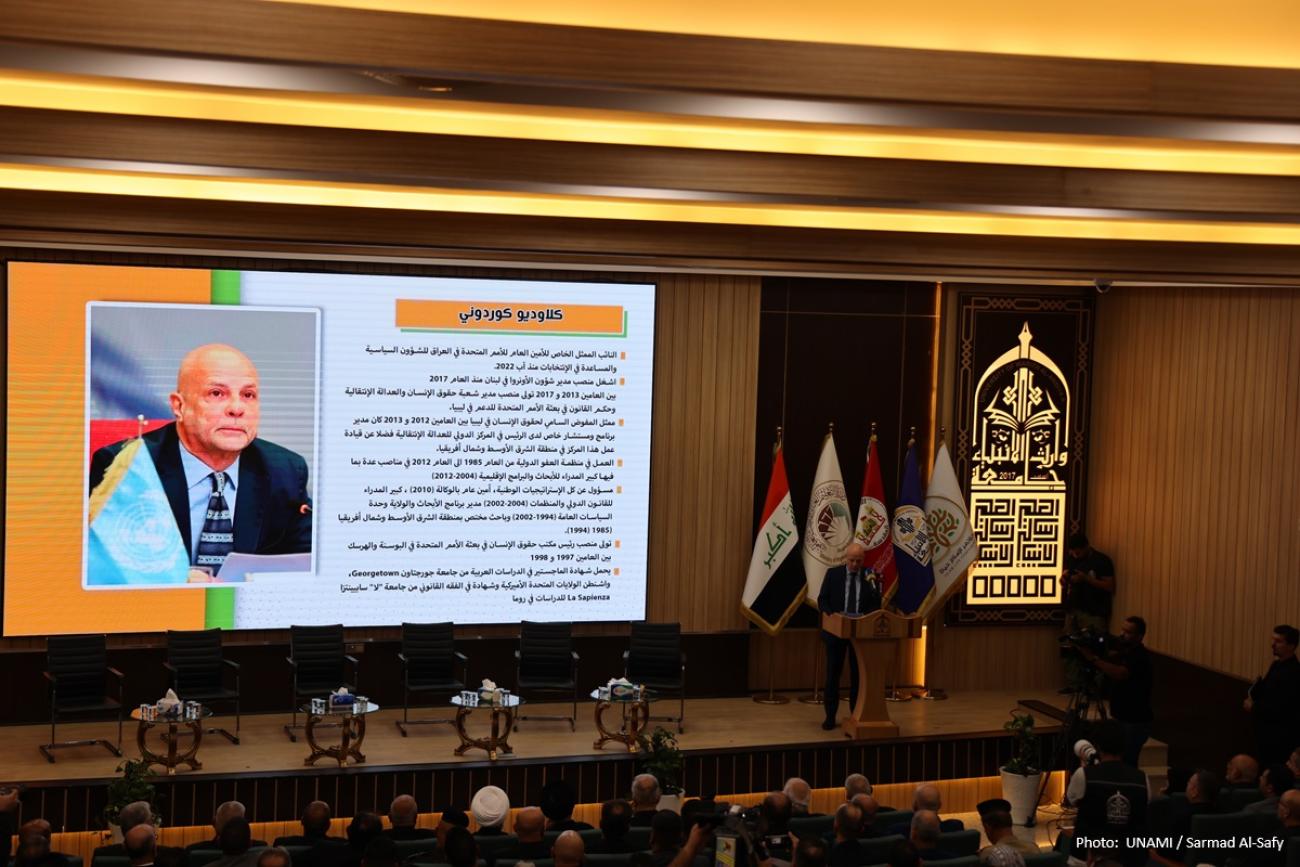Remarks by Claudio Cordone Deputy Special Representative of the UN Secretary-General for Iraq for Political Affairs and Electoral Assistance and UNAMI Officer-in-Charge, Islam is Life Fifth International Conference, Human Rights – Contemporary Challenges

Karbala’, 31 August 2024
Ladies and gentlemen,
Distinguished audience,
It is a great honour for me to address this learned audience today. I am particularly pleased as I have written on the philosophical foundations of human rights and have worked on these issues for more than 30 years. During this time I learned the values of humility and of listening to those with different views than mine.
In this spirit of open dialogue, allow me today to briefly talk about the role of the United Nations on the protection and promotion of human rights globally, as well as some of the contemporary challenges, before offering some observations relating to Iraq.
Ladies and gentlemen,
As you know, the key United Nations human rights document is the 1948 Universal Declaration of Human Rights. This document has opened the way to many important international treaties on this subject. I welcome the fact that Iraq today is a party to all core international human rights treaties.
The Universal Declaration has also inspired regional initiatives such as the 1990 Cairo declaration on human rights in Islam adopted by the Organization of Islamic Cooperation. Despite differences between them, the two declarations share common values such as the emphasis on the inherent dignity of all individuals – the right of every person regardless of who they are.
I wish to stress here that international human rights standards are not Western standards. Many have indeed attained near-universal acceptance, as they reflect fundamental principles such as human dignity, fairness, compassion and non-discrimination that are rooted in many cultures and religious traditions, including Islam.
Ladies and gentlemen,
Among contemporary challenges is the poor record of implementation of the existing human rights treaties across the world. Take for example torture: just about every state condemns it, but it is still widespread.
Another example is the 1949 Geneva Conventions which set limits to the inhumanity of wars. Despite the universal ratification of these conventions, they are still violated with impunity in Gaza and other conflicts across the world.
A challenge that we face regularly is the double standards with which similar situations are treated differently, depending on whether perpetrators are allies or enemies.
And I want to mention the challenge of intolerance for diversity. We all remember the acts of burning the Holy Qur’an last year. His Eminence Grand Ayatollah Ali al-Sistani and United Nations Secretary-General Antonio Guterres exchanged letters on this subject, condemning acts of religious hatred and appealing for peaceful coexistence.
I should underline that these were attacks on Muslims because of their very identity. One lesson is the importance of respect for diversity: no one should be targeted simply because of who they are.
Ladies and gentlemen,
Let me make a few final remarks about Iraq. Rich in history, culture, and pluralism, Iraq has suffered immensely from dictatorship, senseless wars and violent extremism.
In this context I welcome the initiative by Prime Minister Muhammad Shia al-Sudani to develop a national strategy to counter hate speech, while respecting freedom of expression.
Another important national priority which converges with the implementation of social, economic and cultural rights is the improvement of services and the standard of living.
There are areas, however, that are cause for concern. For example, the proposed amendments to the Personal Status Law, if adopted, may result in the contravention of a number of human rights treaties that Iraq is a party to. Here I call for an open, inclusive and respectful dialogue, which I believe would address misunderstandings and bridge many gaps.
Ladies and gentlemen,
I would like to conclude with the words of the United Nations High Commissioner for Human Rights at the end of his visit to Iraq in August 2023, when he said: “Human rights must not be instrumentalized to divide us – human rights are what unites us, what brings us together as humanity, in dignity.”
Once again, I thank you for the honour of inviting me to this conference and I look forward to your discussions.
Thank you.


